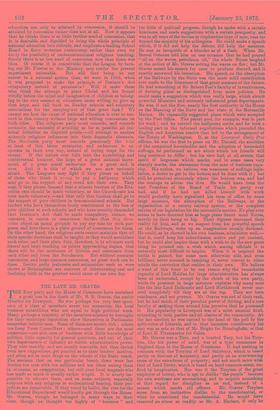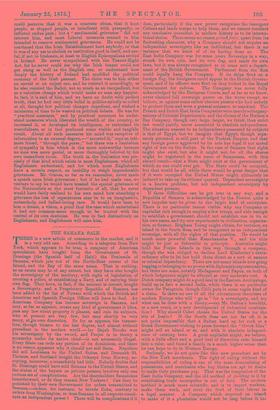THE LATE MR. GRAVES.
THE Tory party and the House of Commons have sustained a great loss in the death of Mr. S. R. Graves, the senior Member for Liverpool. He was perhaps the very best speci- men of a class of members never too numerous, the local business notabilities who are equal to high political work. Many, perhaps a majority, of the members selected by boroughs for their municipal reputation show themselves in Parliament somewhat inferior men. Some of them are merely rich ; others are fussy Town Councillors ; others—and these are the most numerous—are able men of business with little knowledge of politics, little capacity for general questions, and out of their own departments of industry no visible administrative power. They vote steadily, and are usually tractable, but they shrink from new suggestions, get puzzled as to their leaders' motives, and often act as mere drags on the wheels of the State coach. The sarcasm that on one particular bench there were last Session ten men with ten millions and ten ideas among them is, of course, an exaggeration, but still your local magnate who has made so much is usually rather stupid. It is nearly im- possible to educate them, and on some subjects, especially subjects with any religious or ecclesiastical bearing, their pre- judices are immovable. If they voted by ballot, the vote for the Educational Department would hardly get through the House. Mr. Graves, though he belonged in many ways to their class, though he thought too highly of " business " and
too little of political progress, though he spoke with a certain heaviness, and made suggestions with a certain pomposity, and was in all ways of the bovine or elephantine.type of men, rose far beyond the majority of his colleagues. He could make a speech which, if it did not help the debate, did help the measure. He was as incapable of a blunder as of a flash. When Mr. Bernal Osborne told him on one occasion that he had poured " oil on the waves, petroleum oil," the whole House laughed at the notion of Mr. Graves setting the waves on fire ; but Mr.
Graves meant his speech for once to produce discord, and it exactly answered his intention. His speech on the absorption of the Railways by the State was the most solid contribution ever made to the literature of that great measure of the future.
He had something of Sir Robert Peel's faculty of inventiveness, of devising plans as distinguished from mere policies. He
could make a suggestion which was really large, which struck
powerful Ministers and seriously influenced great departments. He was, if not the first, nearly the first authority in the House on the Manning of the Navy and the state of the Mercantile Marine. He repeatedly suggested plans which were accepted by the Post Office. The parcel post, for example, was in part his work ; and he carried the halfpenny cards, and he took a leading part in the informal negotiations which preceded the English and American resolve that led to the arrangement of the Treaty of Washington. If, as the Liverpool Daily Post affirms, he was the first to press on Mr. Disraeli the abolition of the compound householder and the adoption of household suffrage, he performed an act about which his friends will long continue to differ ; but his view had, at all events, that merit of largeness which marks, and in some cases very sharply marks, the statesman from the man of business capa- city. His notion, we believe, was weariness of suffrage legis- lation, a desire to get to the bottom and be done with it ; but still he perceived accurately where the bottom was, and had the courage to advise the dive. He would have been the best President of the Board of Trade his party ever had, and if he had not killed himself with work would probably have signalised his term of office by some large measure, the absorption of the Railways, or the organisation of a county railway system, or the complete reform of our legislation for the mercantile marine. No plan ever seems to have daunted him as large plans daunt most Tories, merely by their being so big. Their bigness increased their reality for him, and as we suspect from his powerful speech on the Railways, woke up an imagination usually dormant.
He could, as he showed in his own business, administer well,—
that is, could keep his subordinates active and yet content, but he could also inspire them with a wish to do the new great thing he pointed out, a wish which among officials it is naturally most difficult to inspire. When it is inspired the battle is gained, but some men otherwise able, and even brilliant, never succeed in inspiring it, never convey to other minds the conviction that resides in their own. We believe a want of this force to be one reason why the remarkable capacity of Lord Halifax for large administration has always been so underrated, except by the chiefs of his own party, while its presence in large measure explains why many men like the late Lord Dalhousie and Lord Northbrook never suc- ceed completely till they are at the top. They are born coachmen, and not grooms. Mr. Graves was not of their rank, but he had much of their peculiar power of driving, and a rare faculty of making those around him perceive that he possessed it. His popularity in Liverpool was of a most unusual kind, extending to both parties and all classes of the community. At the last election he was carried to the head of the poll by the split-votes of Liberals, and in that immense constituency his seat was as safe as that of Mr. Bright for Birminghaln, or that of Lord E. Fitzmaurice for Calne.
Mr. Graves was a Tory, and a trusted Tory, but his Tory- ism, like his power of mind, was of a type commoner in England than in the House of Commons. It had nothing in common with the Toryism of Lord Salisbury, which is based partly on distrust of humanity, and partly on an overweening sense of the sacredness of property; and not much more with that of Lord Derby, which is based on hard common-sense, un- fired by imagination. Nor was it the Toryism of the great employer of labour, who is apt to dislike "the people" because his own workman are encroaching, and to acquire something of that regard for discipline as an end, instead bf a means, which marks old officers. Mr. Graves' Toryism arose from an instinctive dislike to the unsubstantial, or what he considered the unsubstantial. He would have removed an abuse as readily as Mr. A. Herbert, if only he
could, perceive that it was a concrete abuse, that it hurt people, or stopped people, or interfered with prosperity, or inflicted undue pain ; but a " sentimental grievance " did not interest him, and most Liberal measures seemed to him intended to remove sentimental grievances. He could not be convinced that the Irish Establishment hurt anybody, or that it was of any use to abolish an institution good in itself, and use- ful, if not to Irishmen, at least to English Episcopalians settled in Ireland. He never sympathised with the Tenant-Right Act, for he never could see why the Irish tenant could not get along as well as the English one, or understand how deeply the history of Ireland had modified the political economy of the Irish peasant. The claim was to him either an unreal or an unjust one, and he resisted it accordingly, as he also resisted the Ballot, not so much as an inexpedient, but as a valueless change which would make no man any happier. In fact, it is said of him, and we have no doubt with perfect truth, that he had very little belief in politics strictly so called at all, thought few political changes expedient, and wished a minimum of time to be wasted on political debate. He was for " practical measures," and by practical measures he under- stood measures which liberated the wealth of the country, or increased it, or developed its intelligence, or restrained its wastefulness, or in fact produced some visible and tangible result. About all such measures his mind was receptive of information to an unusual degree,—" secreted it," says an inti- mate friend, "through the pores ;" but there was a limitation of sympathy in him which is the more noteworthy because no man was more genial, or more thoroughly beloved by his, own immediate circle. The truth is, the limitation was pre- cisely of that kind, which exists. in most Englishmen, which all Englishmen understand, and for which most Englishmen have a certain respect, an inability to weigh imponderable grievances. Mr. Graves, so far as we remember, never made a speech upon Irish grievances ; but if he had made one, we venture to say he would have treated the special grievance of the Nationalists as the most fantastic of all, that he never would have fairly realised to his own mind how absorbing a grievance the• loss of separateness may be to an imaginative, melancholy, and ballad-loving race. It world have been to him a dream, a vision, a proof that the race which entertained it had not common-sense enough to be trusted with the control of its own destinies. He was in fact distinctively an Englishman, and Englishmen will miss him.



































 Previous page
Previous page